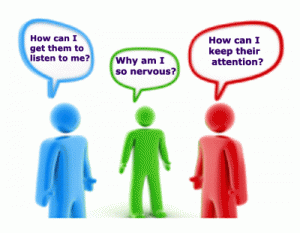Never before in social history has it been more important to learn how to package information in such a way that it is palatable for your audience to hear; and easy to remember, in other words, learn how to present information efficiently. The reason for this is twofold:
- we live in a world where we are exposed to more information than we ever have been before
- we have a different relationship to information today, because it’s never been as cheap or easy to access
This is largely to do with the Internet. Due to the fact that there is so much information on-line, about every subject that you can possible think of, communicated and written about from every angle, depicted through millions of images and YouTube videos, one of the big questions I ask my clients is: why would people sit and listen to you in a meeting or in a formal presentation forum?
Teachers, marketers, advertisers and writers (and other artists like film makers and song writers) are amongst some who have been aware of this for a long time. They study for years to learn how to make their message sticky, how to understand what their audience needs from them and how to ‘say it’ in a way that is succinct and meaningful. Those who are successful get these skills right; and those who are less successful have work to do in learning how to package what they have to say more effectively – and it is just a skills set.
Whatever part of the business you run, whether it be in sales, marketing, finance, learning and development, human resources, product development or project management, for example, at some point you will be expected to stand up and present to your colleagues or consumers, contribute to a meeting, or distribute ideas. So it does not really matter which part of the business you are in or where in the hierarchy you sit, your need to present well so that people listen to you is important.
Great presentations are so much more than the PowerPoint. In fact the PowerPoint should be secondary to YOU (otherwise just send the presentation to me to read on my own). This is not to say that the way you package your PowerPoint is not important, but it should compliment rather than dominate you. Presenting is also a lot more than just the slides you have and the way you stand and speak. There is a psychological component to being a great speaker as well. After all, it is the thing that people get most afraid of and nervous about when they have to do it. 
Here are three big things to think about:
- People are either visual, audio or kinetic learners and usually a combination of two
- In order for a message to be sticky, it has to mean something (or have an impact on those receiving the message)
- It is not enough to bring people information, you have to bring them insights into that information, that’s why they will listen to you and not just read the presentation in PDF format that you have sent to them via email
And remember being a fantastic and confident presenter is something you can learn.
TomorrowToday has a fun, practical and easily applicable Presentation Skills course, which we would love to share with you and your colleagues. Recently the Sales Director at Sage Alchemex said told me that he had a huge presentation to do for clients around a potentially huge deal that he was really worried about, even though he had always thought of himself as a ‘pretty good speaker’. After doing TomorrowToday’s course he said he felt so much more confident going in to this presentation. I asked him why; and he said because he felt prepared and confident. He said he could not believe how easy it was to apply the simple messages he had been taught on how to package information in to a memorable presentation.
Being able to confidently command an audience with excellent presentation skills is a business differentiator in the new world or work. Contact [email protected] to find out how you can participate in an exciting adventure.


